

10 Free Screen Readers For Blind Or Visually Impaired Users. It is not difficult for a sighted person to imagine how being blind or visually impaired could make using a computer difficult.
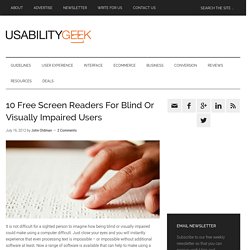
Just close your eyes and you will instantly experience that even processing text is impossible – or impossible without additional software at least. Now a range of software is available that can help to make using a computer an easier, more enjoyable and more productive experience for blind or visually impaired users. Essential Software: A Screen Reader A screen reader is an essential piece of software for a blind or visually impaired person. Simply put, a screen reader transmits whatever text is displayed on the computer screen into a form that a visually impaired user can process (usually tactile, auditory or a combination of both).
Whilst most screen readers work by having a synthetic voice that reads text aloud, others can also communicate data via a refreshable braille display. Colourblind Tube Map. The iconic tube map has featured on many Mapping London posts but not everyone sees the familiar colours in the same way.
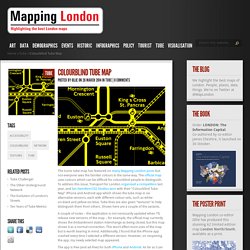
The official map uses colours which can be difficult for colourblind people to distinguish. The Paciello Group – Your Accessibility Partner (WCAG 2.0/508 audits, VPAT, usability and accessible user experience) Media accessibility notes. Thailand Disability. PWDs-Statistics-in-Pakistan-2012-2. Media Ethics and Regulations in Pakistan. 13173_Disability%20Framework%20in%20Pakistan.
S.B. 2117: Filipino Sign Language Act in Broadcast Media of 2014. Bk_australia_mediacontentregulation_12. Thailand Disability. Media accessibility notes. 04. What is media access? AUTHOR’S NOTE – You’re reading the HTML version of a chapter from the book Building Accessible Websites (ISBN 0-7357-1150-X).
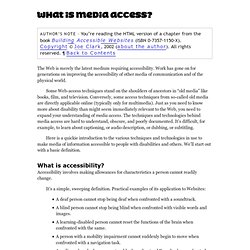
Copyright © Joe Clark, 2002 (about the author). All rights reserved. ¶ Back to Contents The Web is merely the latest medium requiring accessibility. Chapter 26. Changing the Physical and Social Environment > Section 4. Ensuring Access for People with Disabilities > Main Section. Making information accessible. Everyone has the right to access public information.
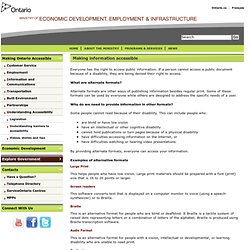
If a person cannot access a public document because of a disability, they are being denied their right to access. What are alternate formats? Alternate formats are other ways of publishing information besides regular print. Wcms_127002. Refresher Media Training on Reporting Disability in Indonesia. Background Decent work is the ILO's primary goal for everyone, including persons with disabilities.
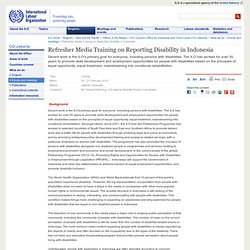
The ILO has worked for over 50 years to promote skills development and employment opportunities for people with disabilities based on the principles of equal opportunity, equal treatment, mainstreaming into vocational rehabilitation. Amongst others, since 2001, the ILO-Irish Aid Partnership Programme has worked in selected countries of South East Asia and East and Southern Africa to promote decent work and a better life for people with disabilities through enabling legal and policy environments, and by providing entrepreneurship development training and access to related services, with a particular emphasis on women with disabilities. Training Manual for Media and Disability Rights. Disability Awareness in Action, 1999 All rights reserved Written by Rachel Hurst Designed and edited by Richard Light, Published by Disability Awareness in Action.
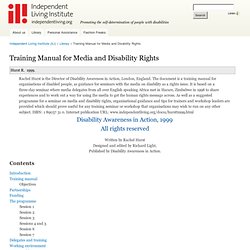
Contents IntroductionTraining manual Objectives. Disability Advocacy through Media Training Course. Overview of Disability in China - Disabled World. Abstract: Social attitudes towards people with disabilities have gone through a gradual change in China.
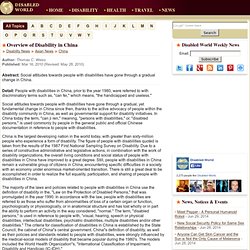
Detail: People with disabilities in China, prior to the year 1980, were referred to with discriminatory terms such as, "can fei," which means, "the handicapped and useless. " Self-reliance in interdependent communities: Independent living of disabled persons in the Asia-Pacific region. Paper prepared by Yukiko Oka, Programme Specialist, Social Development Division Economic and Social Commission for Asia and the Pacific (ESCAP) presented at the Post Congress Seminar on Social Rehabilitation Rehabilitation International 10 -11 September 1988 Hamamatsu, Japan I find this subject interesting, because only a few studies have been done concerning the independent living of disabled persons in the Asia-Pacific region.
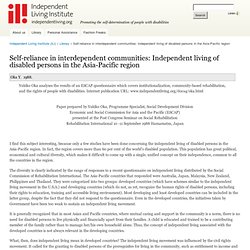
In fact, the region covers more than 60 per cent of the world's disabled population. This population has great political, economical and cultural diversity, which makes it difficult to come up with a single, unified concept on their independence, common to all the countries in the region. The diversity is clearly indicated by the range of responses to a recent questionnaire on independent living distributed by the Social Commission of Rehabilitation International. What, then, does independent living mean in developed countries? United Nations. Reporting about people with disabilities - Asia - Asia.
In many societies, people with disabilities are pushed aside – be they mentally challenged or physically impaired.
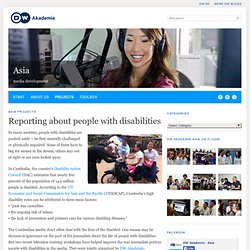
Some of them have to beg for money in the streets, others stay out of sight or are even locked away. In Cambodia, the country’s Disability Action Council (DAC) estimates that nearly five percent of the population of 14.9 million people is disabled. According to the UN Economic and Social Commission for Asia and the Pacific (UNESCAP), Cambodia’s high disability rates can be attributed to three main factors: • “past war casualties • the ongoing risk of mines, • the lack of prevention and primary care for various disabling diseases.”
The Cambodian media don’t often deal with the lives of the disabled. One reason may be shyness or ignorance on the part of the journalists about the life of people with disabilities. MediAsia2013_offprint_0232. Changing Attitudes Towards Persons with Disabilities in Asia. Introduction We are in the last phase of the United Nations' "Asian and Pacific Decade of Disabled Persons" (1993-2002).
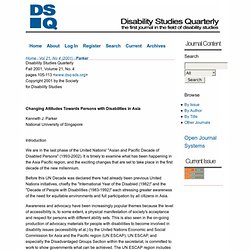
It is timely to examine what has been happening in the Asia Pacific region, and the exciting changes that are set to take place in the first decade of the new millennium. World Laws - Asia (Hong Kong and Japan) You are here: Home > Articles > World Laws > Page 6: Asia (Hong Kong and Japan) Hong Kong: Early Awareness of Web Accessibility Issues Interregional seminar and symposium on web accessibility in Hong Kong, Dec. 13-17, 1999. This article discusses web accessibility in general and then more specifically the situation in Hong Kong. ANMB%20Report%202010%20ENG.